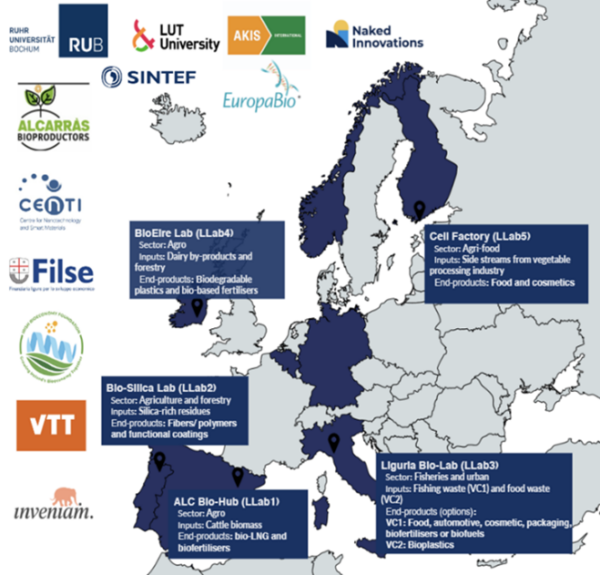PRIMED: Redesigning the Primary Sector for Maximizing Bioeconomy Development
Kompetenzfeld/er:
Über das Projekt
The PRIMED project, dedicated to unlocking the vast potential of underutilized biomass resources from primary sectors, has been officially launched. Supported by the European Union’s Horizon Europe Program, and involving a consortium of 12 partners from Belgium, Finland, Germany, Ireland, Italy, Norway, Spain, and Portugal, it will develop diverse fair value chains to convert underutilized biomass resources into value-added bio-based products via advanced biorefineries.

Developing fair business models to unlock the hidden potential of biomass resources and drive positive impact on bioeconomy, sustainability, and rural economies across Europe
Project Details and Objectives
- To support the bioeconomy strategy of the EU and in the context of the Horizon Europe call “Business models that balance the share of power and profit in the bioeconomy” (HORIZON-CL6-2023-CircBio-01-9), the European Union has awarded PRIMED Consortium a €4 million grant for the R&D to develop and test innovative Circular Business Models (CBM) in the bioeconomy.
- The project involves primary producers and end-users through bioeconomy Living Labs in five countries to showcase and test these models for three years (2024 to 2026). Aiming for broad impact, PRIMED also plans to develop an open-access digital toolbox to facilitate collaboration among European stakeholders.
- PRIMED will co-create innovative Circular Business Models (CBM) in the bioeconomy with a multi-actor approach, integrating primary producers into novel bioeconomy value chains. This effort seeks to boost primary production, reduce costs, and contribute to European industrial sustainability, competitiveness, and resource independence. The project additionally aspires to restore the environment, create green jobs, and build resilience in rural economies.
EU Biomass Potential and Strategy
The EU has a significant amount of residual biomass available, more than 900 million tons per year, and 98% of this material ends up in landfill, incinerators, or rotting in open dumps, representing a loss of value, a source of pollution, and a risk to public health. The EU possesses the capability to convert bio-waste into a spectrum of bio-based products with diverse applications, spanning bioplastics, biochemicals, biofertilizers, biomaterials, biofuels, and food and feed industries. This envisioned revalorization holds the potential to directly underpin 5-10 times more employment opportunities and generate 4-9 times more added value than solely using it to generate energy.
The EU’s bioeconomy strategy aims to accelerate the deployment of a sustainable European bioeconomy by driving the renewal of industries, modernizing primary production systems, protecting the environment, and enhancing biodiversity. This strategy is based on three key priorities: strengthening and scaling up the bio-based sectors, unlocking investments and markets and understanding the ecological boundaries of the bioeconomy. To achieve these policy objectives requires a fundamental transformation across various societal sectors, with diverse, disruptive innovations coupled with new circular business models and value chains.
Implementing PRIMED
These innovations will be showcased in five Bioeconomy Living Labs located in Finland (agri-food side-streams to ingredients for novel food and cosmetic applications), Ireland (dairy by-products and forestry biomass to biodegradable plastics and bio-based fertilisers), Italy (fish-industry side-streams, food waste and agricultural waste to bioplastics, biodiesel, fertilisers and high value-added food supplements), Portugal (agro-industrial residues to functional silica nanoparticles, polymers and functional coatings), and Spain (livestock manure and agricultural waste to compressed natural biogas, irrigation water and electrical power).
Understanding the importance of local cultural values and stakeholder relationships, PRIMED will build shared agendas in the Living Labs territories, aligning different actors' expectations along the value chain. Moreover, PRIMED will directly involve primary producers and end-users through an Open Call for applicants offering 10 projects up to 60,000€ funding, to test products and develop CBMs across the five Living Labs. This initiative provides selected end-users with a unique opportunity to test and validate bio-based products, fostering collaboration and real-world application.
Project Impact
PRIMED's CBMs can enhance primary production by reducing costs, diversifying income streams, and creating a high-value-added product portfolio. In addition, by producing high-value bio-based products through advanced biorefineries and a circular value chain approach, PRIMED aims to boost European industrial sustainability, competitiveness, and resource independence. The project aims to dynamize and build resilience in rural economies by generating new green jobs and investments, while it contributes to environmental restoration by restoring carbon content in soil, increasing nutrients, and revitalizing marginal lands.
Aiming for wide replication of these models, PRIMED aims to create an open-access digital toolbox that facilitates collaboration and cooperation between European stakeholders, offering a repository of tools, methodologies, guidelines, reports, and more. As the project progresses, the consortium looks forward to sharing success stories and milestones achieved on this journey toward a more sustainable and prosperous future.
More information here.
Projektpartner
Gefördert von



